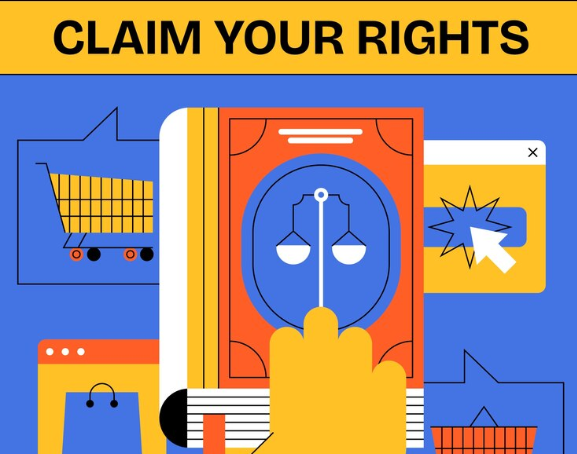In today’s market, consumers face an ever-expanding variety of products and services. While this variety brings benefits, it also introduces risks, as not all products and services meet expected standards. Consumer protection laws safeguard these rights, providing recourse when companies fail to meet their obligations.
- Understanding Consumer Protection Laws:
Consumer protection laws aim to empower consumers by ensuring they have:
- The Right to Safety: Products should not pose a risk to consumers’ health or safety.
- The Right to Be Informed: Accurate, clear information about a product or service, allowing consumers to make informed decisions.
- The Right to Choose: Freedom to select from various products and services, promoting healthy competition.
- The Right to Be Heard: Assurance that consumer concerns will be addressed, with mechanisms for complaints and redressal.
These rights form the basis of most consumer protection frameworks worldwide, designed to promote transparency, fairness, and accountability in business practices.
2. What to Do If You’ve Been Sold a Defective Product:
When faced with a defective product, it’s easy to feel frustrated, but following a structured approach can lead to a smoother resolution:
- Step 1: Review Product Documentation– Before reaching out to the seller, check if the defect is covered under the product’s warranty or return policy. Look for any terms that specify conditions for returns, repairs, or exchanges.
- Step 2: Reach Out to Customer Service– Contact the seller’s or manufacturer’s customer support team. Be clear about the issue, providing photos or videos if needed. Most companies try to resolve issues quickly to maintain customer satisfaction.
- Step 3: Request Documentation of the Interaction– After each call or chat, ask for a summary email detailing the next steps. This can serve as evidence if you need to escalate the complaint.
- Step 4: Utilize Alternative Dispute Resolution (ADR)– If direct resolution doesn’t work, ADR methods like mediation or arbitration may help resolve the issue. Consumer protection agencies often encourage ADR to avoid lengthy court processes.

Consumer Rights Lawyer in Bangalore
3. Filing a Complaint with the Consumer Protection Board:
If the seller or manufacturer fails to resolve your complaint satisfactorily, consider filing a formal complaint with a consumer protection authority:
- Identify the Appropriate Agency: In most countries, consumer protection boards are organized based on categories, like electronics, services, or financial products. Knowing the right board ensures your complaint reaches the correct department.
- Craft a Clear and Detailed Complaint: When filing, clarity and detail are key. Clearly outline:
a. Product Details: Include the brand, model, purchase date, and price.
b. Issue Description: Describe the defect, how it affects the product’s functionality, and any previous efforts to resolve it.
c. Desired Resolution: State whether you’re seeking a refund, replacement, or repair.
- Know Your Options for Escalation: If the consumer board doesn’t respond within a reasonable timeframe, check for any appellate options. Many consumer protection boards have internal appeal mechanisms.
- Track Your Case Status: Many consumer boards have online portals to track complaint status. Checking in regularly ensures you stay informed on case progress and required follow-ups.
4. Refunds, Warranties, and Guarantees: Essential Knowledge:
Refunds, warranties, and guarantees can be confusing, but knowing their differences can help you navigate them more confidently:
- Refunds:
Refund policies vary widely. Some sellers offer full refunds within a specified timeframe (e.g., 30 days), while others may only offer exchanges or store credit. Keep in mind:
a. Some products, like digital downloads, may be non-refundable.
b. Refunds may be partial if the product shows signs of use.
- Warranties:
Warranties are legally binding promises regarding the product’s performance, typically covering defects in materials or workmanship. Types of warranties include:
a. Express Warranties: Specifically stated, covering parts, repairs, or replacements.
b. Implied Warranties: Unspoken, legally recognized warranties that products will function as expected for their type (e.g., a refrigerator should keep food cold).
c. Extended Warranties: Sold as add-ons, these extend coverage beyond the standard period. Make sure they’re worth the cost by comparing their terms with the original warranty.
- Guarantees:
Guarantees are broader commitments, promising the product will meet specific standards. For example, a satisfaction guarantee may entitle you to a refund if the product does not meet your expectations, regardless of any defect.
- Practical Tips:
a. Always register warranties if the manufacturer requires it for coverage.
b. Check for exclusions, like damage from misuse or unauthorized repairs, which could void the warranty.
c. Keep all proof of purchase documents and warranty cards, as they may be required for claiming a refund or replacement.
5. Consumer Protection Tips for a Smoother Experience:
- Stay Informed: Regularly check product terms and policies before purchasing, especially for high-value items.
- Be Assertive but Patient: Approach resolutions professionally but stay persistent if companies delay or evade responsibilities.
- Use Consumer Reviews and Social Media: Often, voicing concerns on review sites or social media can lead to faster responses from companies eager to protect their brand image.
- Know Your Legal Rights: Many countries have laws prohibiting unfair trade practices, false advertising, and deceptive pricing. Familiarize yourself with these laws to confidently challenge violations.

Conclusion:
Navigating consumer protection laws can seem daunting, but understanding your rights is essential for protecting yourself from unfair practices. Equipped with the knowledge of what to do if sold a defective product, how to file a complaint, and the differences between refunds, warranties, and guarantees, you can make informed decisions and seek effective resolutions. Always document your interactions, be clear about your desired resolution, and don’t hesitate to escalate your complaint if necessary.
Disclaimer:
The information provided in this article is for general informational purposes only and does not constitute legal advice. While efforts have been made to ensure the accuracy of the content, Bisani Legal and its representatives are not responsible for any errors or omissions, or for any outcomes resulting from reliance on this information. Readers are advised to consult a qualified legal professional for specific legal guidance related to their individual property matters. The use of this article does not establish an attorney-client relationship between the reader and BisaniLegal.
Published by: Mr. Saket bisani
Date: 19/12/2024


